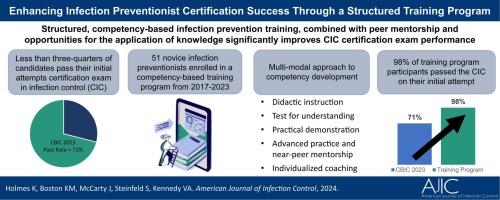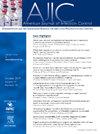Enhancing infection preventionist certification success through a structured training program
IF 3.8
3区 医学
Q2 INFECTIOUS DISEASES
引用次数: 0
Abstract
Background
Certification in infection control (CIC) is a standardized indicator of the knowledge and competencies essential for effective infection prevention practice. Evidence measuring success of training programs for certfication in infection control is limited.
Methods
From 2017 through 2023, 51 novice infection preventionists (IPs) were enrolled in a training program that combined didactic learning, application of knowledge in practice, and mentorship from advanced-practice and near-peer IPs. Participants were tracked through completion of certification examination and pass rates were compared with rates for 2023 CIC candidates.
Results
All participants engaged in the training program attempted the CIC examination. The training group had a pass rate of 98%. This is 27% higher than the most recent rate published by Certification Board of Infection Control and Epidemiology (CBIC) of 71%.
Discussion
Participants were significantly more likely to pass the CIC exam on the first try, showing that a supported, competency-based training program can be successful in supporting novice IPs in certification success.
Conclusions
Building foundational knowledge on key concepts in infection prevention and control and enhancing learning through supervised, direct application of skills improves CIC certification exam pass rates and supports progression of early career IPs to more independent practice.

通过结构化培训计划提高感染预防师认证的成功率。
背景:感染控制和预防认证(CIC)是衡量有效预防感染实践所必需的知识和能力的标准化指标。衡量感染控制认证培训项目成功与否的证据十分有限:从 2017 年到 2023 年,51 名感染预防新手(IP)参加了一项培训计划,该计划结合了说教式学习、实践中的知识应用以及高级实践和近似 IP 的指导。对参加者完成认证考试的情况进行跟踪,并将通过率与 2023 年 CIC 候选人的通过率进行比较:结果:所有参加培训计划的学员都参加了CIC考试。培训组的通过率为 98%。这比感染控制与流行病学认证委员会(CBIC)公布的最新通过率 71% 高出 27%:讨论:学员首次通过 CIC 考试的几率明显增加,这表明基于能力的支持性培训计划可以成功帮助 IP 新手成功通过认证:结论:建立感染预防与控制关键概念的基础知识,并通过监督、直接应用技能来加强学习,可提高 CIC 认证考试的通过率,并支持职业生涯初期的 IP 逐步走向更独立的实践。
本文章由计算机程序翻译,如有差异,请以英文原文为准。
求助全文
约1分钟内获得全文
求助全文
来源期刊
CiteScore
7.40
自引率
4.10%
发文量
479
审稿时长
24 days
期刊介绍:
AJIC covers key topics and issues in infection control and epidemiology. Infection control professionals, including physicians, nurses, and epidemiologists, rely on AJIC for peer-reviewed articles covering clinical topics as well as original research. As the official publication of the Association for Professionals in Infection Control and Epidemiology (APIC)

 求助内容:
求助内容: 应助结果提醒方式:
应助结果提醒方式:


